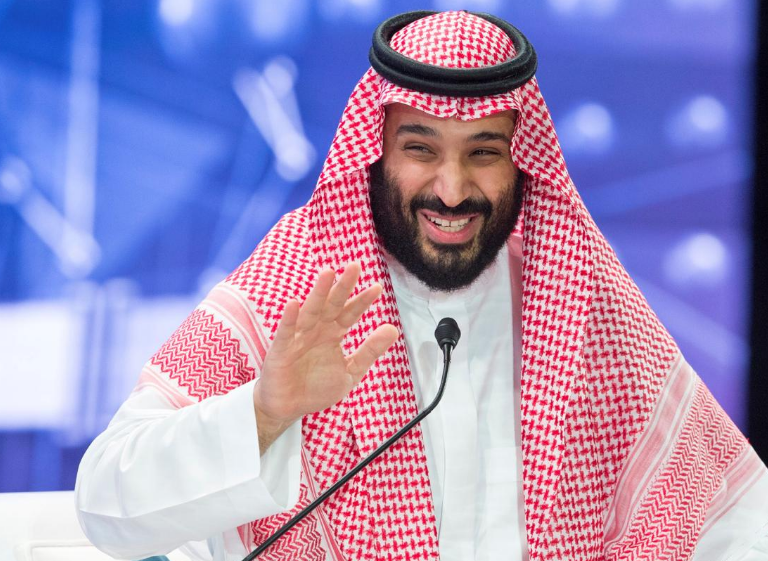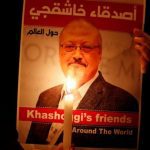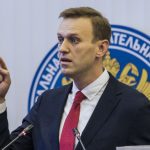Saudi Arabia says it has signed $56 billion of deals at an investment conference this week and expected the United States to remain a key business partner despite a partial boycott of the event over the killing of Saudi journalist Jamal Khashoggi.
Over two dozen top officials and executives from the United States and Europe, including U.S. Treasury Secretary Steven Mnuchin and chief executives of big banks, canceled their participation in the conference over the killing of Khashoggi inside the Saudi consulate in Istanbul on Oct. 2.
There was concern that, temporarily at least, commercial ties with the West could be damaged as the blow to Riyadh’s reputation and the risk of economic sanctions over the Khashoggi affair made it harder to enter new deals.
Still, the three-day Future Investment Initiative conference drew hundreds of businessmen and government officials from around the world to a palatial venue in Riyadh, aiming to attract foreign capital to support Saudi economic reforms.
According to Saudi Energy Minister Khalid Al-Falih “There were more than 25 deals signed worth $56 billion,” adding that U.S. companies accounted for most of those contracts.
He added: “The U.S. will remain a key part of the Saudi economy because the interests that tie us are bigger than what is being weakened by the failed boycotting campaign of the conference.”
Saudi Arabia at first denied any involvement in Khashoggi’s death but a Saudi official eventually attributed it to a botched attempt to return him to the kingdom. Turkey has dismissed Saudi efforts to blame rogue operatives and urged Riyadh to search “top to bottom” for those responsible.
Saudi Arabia says it has signed $56 billion of deals at an investment conference this week and expected the United States to remain a key business partner despite a partial boycott of the event over the killing of Saudi journalist Jamal Khashoggi.
Over two dozen top officials and executives from the United States and Europe, including U.S. Treasury Secretary Steven Mnuchin and chief executives of big banks, canceled their participation in the conference over the killing of Khashoggi inside the Saudi consulate in Istanbul on Oct. 2.
There was concern that, temporarily at least, commercial ties with the West could be damaged as the blow to Riyadh’s reputation and the risk of economic sanctions over the Khashoggi affair made it harder to enter new deals.
Still, the three-day Future Investment Initiative conference drew hundreds of businessmen and government officials from around the world to a palatial venue in Riyadh, aiming to attract foreign capital to support Saudi economic reforms.
According to Saudi Energy Minister Khalid Al-Falih “There were more than 25 deals signed worth $56 billion,” adding that U.S. companies accounted for most of those contracts.
He added: “The U.S. will remain a key part of the Saudi economy because the interests that tie us are bigger than what is being weakened by the failed boycotting campaign of the conference.”
Saudi Arabia at first denied any involvement in Khashoggi’s death but a Saudi official eventually attributed it to a botched attempt to return him to the kingdom. Turkey has dismissed Saudi efforts to blame rogue operatives and urged Riyadh to search “top to bottom” for those responsible.
Saudi Arabia says it has signed $56 billion of deals at an investment conference this week and expected the United States to remain a key business partner despite a partial boycott of the event over the killing of Saudi journalist Jamal Khashoggi.
Over two dozen top officials and executives from the United States and Europe, including U.S. Treasury Secretary Steven Mnuchin and chief executives of big banks, canceled their participation in the conference over the killing of Khashoggi inside the Saudi consulate in Istanbul on Oct. 2.
There was concern that, temporarily at least, commercial ties with the West could be damaged as the blow to Riyadh’s reputation and the risk of economic sanctions over the Khashoggi affair made it harder to enter new deals.
Still, the three-day Future Investment Initiative conference drew hundreds of businessmen and government officials from around the world to a palatial venue in Riyadh, aiming to attract foreign capital to support Saudi economic reforms.
According to Saudi Energy Minister Khalid Al-Falih “There were more than 25 deals signed worth $56 billion,” adding that U.S. companies accounted for most of those contracts.
He added: “The U.S. will remain a key part of the Saudi economy because the interests that tie us are bigger than what is being weakened by the failed boycotting campaign of the conference.”
Saudi Arabia at first denied any involvement in Khashoggi’s death but a Saudi official eventually attributed it to a botched attempt to return him to the kingdom. Turkey has dismissed Saudi efforts to blame rogue operatives and urged Riyadh to search “top to bottom” for those responsible.
Saudi Arabia says it has signed $56 billion of deals at an investment conference this week and expected the United States to remain a key business partner despite a partial boycott of the event over the killing of Saudi journalist Jamal Khashoggi.
Over two dozen top officials and executives from the United States and Europe, including U.S. Treasury Secretary Steven Mnuchin and chief executives of big banks, canceled their participation in the conference over the killing of Khashoggi inside the Saudi consulate in Istanbul on Oct. 2.
There was concern that, temporarily at least, commercial ties with the West could be damaged as the blow to Riyadh’s reputation and the risk of economic sanctions over the Khashoggi affair made it harder to enter new deals.
Still, the three-day Future Investment Initiative conference drew hundreds of businessmen and government officials from around the world to a palatial venue in Riyadh, aiming to attract foreign capital to support Saudi economic reforms.
According to Saudi Energy Minister Khalid Al-Falih “There were more than 25 deals signed worth $56 billion,” adding that U.S. companies accounted for most of those contracts.
He added: “The U.S. will remain a key part of the Saudi economy because the interests that tie us are bigger than what is being weakened by the failed boycotting campaign of the conference.”
Saudi Arabia at first denied any involvement in Khashoggi’s death but a Saudi official eventually attributed it to a botched attempt to return him to the kingdom. Turkey has dismissed Saudi efforts to blame rogue operatives and urged Riyadh to search “top to bottom” for those responsible.
Saudi Arabia says it has signed $56 billion of deals at an investment conference this week and expected the United States to remain a key business partner despite a partial boycott of the event over the killing of Saudi journalist Jamal Khashoggi.
Over two dozen top officials and executives from the United States and Europe, including U.S. Treasury Secretary Steven Mnuchin and chief executives of big banks, canceled their participation in the conference over the killing of Khashoggi inside the Saudi consulate in Istanbul on Oct. 2.
There was concern that, temporarily at least, commercial ties with the West could be damaged as the blow to Riyadh’s reputation and the risk of economic sanctions over the Khashoggi affair made it harder to enter new deals.
Still, the three-day Future Investment Initiative conference drew hundreds of businessmen and government officials from around the world to a palatial venue in Riyadh, aiming to attract foreign capital to support Saudi economic reforms.
According to Saudi Energy Minister Khalid Al-Falih “There were more than 25 deals signed worth $56 billion,” adding that U.S. companies accounted for most of those contracts.
He added: “The U.S. will remain a key part of the Saudi economy because the interests that tie us are bigger than what is being weakened by the failed boycotting campaign of the conference.”
Saudi Arabia at first denied any involvement in Khashoggi’s death but a Saudi official eventually attributed it to a botched attempt to return him to the kingdom. Turkey has dismissed Saudi efforts to blame rogue operatives and urged Riyadh to search “top to bottom” for those responsible.
Saudi Arabia says it has signed $56 billion of deals at an investment conference this week and expected the United States to remain a key business partner despite a partial boycott of the event over the killing of Saudi journalist Jamal Khashoggi.
Over two dozen top officials and executives from the United States and Europe, including U.S. Treasury Secretary Steven Mnuchin and chief executives of big banks, canceled their participation in the conference over the killing of Khashoggi inside the Saudi consulate in Istanbul on Oct. 2.
There was concern that, temporarily at least, commercial ties with the West could be damaged as the blow to Riyadh’s reputation and the risk of economic sanctions over the Khashoggi affair made it harder to enter new deals.
Still, the three-day Future Investment Initiative conference drew hundreds of businessmen and government officials from around the world to a palatial venue in Riyadh, aiming to attract foreign capital to support Saudi economic reforms.
According to Saudi Energy Minister Khalid Al-Falih “There were more than 25 deals signed worth $56 billion,” adding that U.S. companies accounted for most of those contracts.
He added: “The U.S. will remain a key part of the Saudi economy because the interests that tie us are bigger than what is being weakened by the failed boycotting campaign of the conference.”
Saudi Arabia at first denied any involvement in Khashoggi’s death but a Saudi official eventually attributed it to a botched attempt to return him to the kingdom. Turkey has dismissed Saudi efforts to blame rogue operatives and urged Riyadh to search “top to bottom” for those responsible.
Saudi Arabia says it has signed $56 billion of deals at an investment conference this week and expected the United States to remain a key business partner despite a partial boycott of the event over the killing of Saudi journalist Jamal Khashoggi.
Over two dozen top officials and executives from the United States and Europe, including U.S. Treasury Secretary Steven Mnuchin and chief executives of big banks, canceled their participation in the conference over the killing of Khashoggi inside the Saudi consulate in Istanbul on Oct. 2.
There was concern that, temporarily at least, commercial ties with the West could be damaged as the blow to Riyadh’s reputation and the risk of economic sanctions over the Khashoggi affair made it harder to enter new deals.
Still, the three-day Future Investment Initiative conference drew hundreds of businessmen and government officials from around the world to a palatial venue in Riyadh, aiming to attract foreign capital to support Saudi economic reforms.
According to Saudi Energy Minister Khalid Al-Falih “There were more than 25 deals signed worth $56 billion,” adding that U.S. companies accounted for most of those contracts.
He added: “The U.S. will remain a key part of the Saudi economy because the interests that tie us are bigger than what is being weakened by the failed boycotting campaign of the conference.”
Saudi Arabia at first denied any involvement in Khashoggi’s death but a Saudi official eventually attributed it to a botched attempt to return him to the kingdom. Turkey has dismissed Saudi efforts to blame rogue operatives and urged Riyadh to search “top to bottom” for those responsible.
Saudi Arabia says it has signed $56 billion of deals at an investment conference this week and expected the United States to remain a key business partner despite a partial boycott of the event over the killing of Saudi journalist Jamal Khashoggi.
Over two dozen top officials and executives from the United States and Europe, including U.S. Treasury Secretary Steven Mnuchin and chief executives of big banks, canceled their participation in the conference over the killing of Khashoggi inside the Saudi consulate in Istanbul on Oct. 2.
There was concern that, temporarily at least, commercial ties with the West could be damaged as the blow to Riyadh’s reputation and the risk of economic sanctions over the Khashoggi affair made it harder to enter new deals.
Still, the three-day Future Investment Initiative conference drew hundreds of businessmen and government officials from around the world to a palatial venue in Riyadh, aiming to attract foreign capital to support Saudi economic reforms.
According to Saudi Energy Minister Khalid Al-Falih “There were more than 25 deals signed worth $56 billion,” adding that U.S. companies accounted for most of those contracts.
He added: “The U.S. will remain a key part of the Saudi economy because the interests that tie us are bigger than what is being weakened by the failed boycotting campaign of the conference.”
Saudi Arabia at first denied any involvement in Khashoggi’s death but a Saudi official eventually attributed it to a botched attempt to return him to the kingdom. Turkey has dismissed Saudi efforts to blame rogue operatives and urged Riyadh to search “top to bottom” for those responsible.












